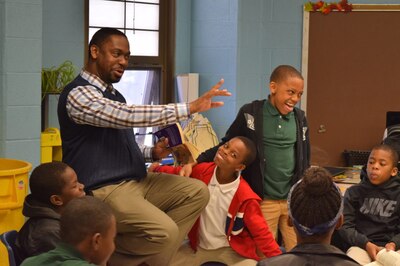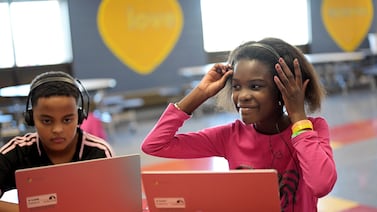Stephen Flemming knew from the time he was five or six years old that he wanted to teach. It was not a common ambition for a Black boy, but one that only grew stronger as he got older — nurtured by his parents, his teachers, and his church community.
Flemming, 38, grew up in Southwest Philadelphia and attended Philadelphia public schools. By 13, he was in charge of a summer camp run by his Pentecostal church, organizing field trips and activities, and supervising students both younger and older than he was. “I always knew I wanted to do something in which I could have a long-lasting impact on youth,” he said. “Teaching was it. I never considered anything else seriously.”
I met him three years ago when I wrote about the impact of Black male teachers and visited Flemming’s classroom at John B. Kelly elementary school in Philadelphia’s Germantown neighborhood. A Johns Hopkins study had just found that Black students from low-income families who were randomly assigned to one Black teacher between third and fifth grade were significantly more likely to graduate high school and attend college. (Throughout his entire K-12 education, Flemming himself had just three Black male teachers — two in music and one in science.)
Ten-year-olds aren’t generally eager to talk to reporters, but in Flemming’s class the students lined up to tell me about their teacher’s impact on their self-image as learners and their attitudes about school. “Seeing a Black man teaching us actually changes our lives,” one boy told me. “We can be believing that we can be anything we want.”

After a decade at Kelly, Flemming earned a doctorate in education at Drexel University and is in his fourth year at Martin Luther King High School. He is now the teacher leader for English Language Arts and teaches a dual enrollment class in communications, meaning students also earn college credit for the course. That’s a big deal for students at King, one of Philadelphia’s storied but often troubled neighborhood high schools. It’s a place where “people wouldn’t think of having college classes,” Flemming said. “Students think, ‘I can be at King and academically focused and not caught up in what we know the reputation of the school can be.’ I love it.”
This interview has been lightly edited for length and clarity.
How do you get your students to love learning?
It’s all about building relationships. I do not believe that any meaningful teaching and learning can occur without building relationships. I approach that on day one by getting their autographs. That was a staple of mine since I worked at the YMCA, and then at the school district. When I first saw a child, I’d tell them, ‘Write your goals, write what you want to be when you grow up, sign it, and date it.’ It shows I am interested in them as a person and I believe they can be whatever they want to be. And I tell them, when you become famous, you can never deny you knew me. That would open the door for some of them not to be so stressed about the school year.
I work with mostly Black students, and I also bring race into the conversations about how that affects expectations of them. We would talk about how we’re going to rise to the challenge and exceed what others expect of us. That went on all year long, and many bought into that mentality. With older students, it’s more difficult, they’re set in their ways, but maybe I started a spark in some of them.
How do you maintain relationships in the virtual environment?
It’s a paradox, actually. I don’t make them turn the cameras on. Some teachers are gung ho about that; I’m not. It’s laughable, really — I do not know what some of my students look like. I could pass them on the street, and they could be my student, and I would have no clue. But students’ home environments are different. We’ve seen with so many of them what is happening in the background. One student the other day was supposed to lead our podcast, and she said, “I can’t, there’s so much going on in my house right now.” So I tell them, use the chat and let me know you’re there. But by me not insisting they turn on their camera, they know that I get it.
Tell me about your communications class.
It’s mostly a speech class. It’s all about verbal expression. So we do a podcast, called “Behind the Eyes of Our Youth.” It’s completely student-driven. They come up with the topics and who the moderators will be. I put out a survey and ask what we should talk about in the next episode. The last one we recorded was on entertainment, what’s hot and not in music and such. We also do more serious topics. We’ve done black hairstyles, the election, redlining and its relationship to crime, the murder of Breonna Taylor. All I do is edit it, pick out the dead air, and publish it.
This year there was George Floyd’s killing, and last month in Philadelphia, police killed a mentally ill Black man named Walter Wallace. How did you deal with that in your classroom?
That was a terrible week, King had lost a student that weekend to gun violence in the street. He was at a vigil for his cousin who was killed, and he was shot and killed. They were both King kids, and I had the second one. Then Monday was Walter Wallace. I had class Tuesday and Thursday. When we first entered virtual space, I took attendance, and then one student typed in the chat, “We should talk about Walter Wallace.” I said, “Absolutely — I’m interested in whatever you want to say.” I hadn’t intended for it to take up the whole 90 minutes, but their thoughts were flowing. They expressed their dismay about violence overall, police violence, and violence within our community. We were coming off the summer demonstrations in the city after George Floyd, and they knew I was out there, and I didn’t mind sharing I was out there masked up and protesting.
What will it take to get more African American men into teaching?
Many Black men are heads of households, and teaching doesn’t pay much. In traditionally minded thinking, it’s a female-dominated profession, and historically that’s why it’s such a low-paying gig. That might always be a reason. It would take more money, high pay, more respect. But if they understood the social and cultural and long-lasting impact, they may consider it, even if the pay isn’t there. Like how I saw it when I was younger, that we have a chance to impact children’s lives for a possible lifetime.





